Today Current Affairs: 27th August 2021 for UPSC IAS exams, State PSC exams, SSC CGL, State SSC, RRB, Railways, Banking Exam & IBPS, etc
Table of Contents
What Is An e- visa?

India has decided to “invalidate” or cancel all visas issued to Afghan nationals, including about 2,000 issued in the last few months, as the Taliban began to make advances across the country.
- Now, all Afghans must enter India now only on special e-visas applied online.
- The government was concerned that passports deposited by Afghan nationals for visas, which were being stored at the Indian Embassy and the Indian visa centre in Kabul, could get into the hands of anti-India terror groups. As a result, the Home Ministry decided to cancel them.
- The e-visa system is an innovation introduced by the government in 2014. The facility was expanded in 2017-2018.
- The process has its roots in the 2010 Tourist Visa on Arrival (TVOA) scheme for Japan, Singapore, Finland, Luxembourg and New Zealand.
- The government merged the TVOA with Electronic Travel Authorisation, thereby creating the e-visa.
- The Ministry of Home Affairs is the nodal ministry that issues visas to foreigners.
- An e-visa also called Electronic Visa is provided in five categories—tourist, business, conference, medical, and medical attendant.
- Exceptions:
- The facility is not available for the citizens of Pakistan and they are expected to apply for regular visas from the Indian High Commission in Islamabad.
- E-visas are not valid for foreign diplomats which are dealt separately.
Delta Variant Sub-lineage AY.12:
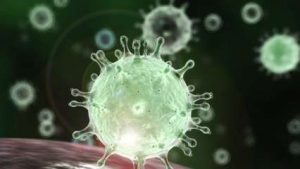
According to a report by the Indian SARS-CoV-2 Genomics Consortium (INSACOG), a new sub-lineage AY.12 of the Delta variant of Covid-19 that was recently classified in Israel is now being reported in many parts of India.
- INSACOG is a multi-laboratory, multi-agency, Pan-India network to monitor genomic variations in the SARS-CoV-2 by a sentinel sequencing effort.
- INSACOG has pointed out that several cases in India classified as Delta are now being reclassified as AY.12 and these numbers are under close watch.
- The reclassification is primarily to assist micro-epidemiology and is not based on acquisition of significant mutations. Thus, it is not currently known whether AY.12 is clinically different from Delta.
- While no worrying factors have been found linked to the AY.12, it has come on INSACOG’s radar as it is said to be driving the surge in Israel despite 60% vaccination in the country.
Delta Variant:
- B.1.617.2—also termed the Delta variant—is believed to spread faster than other variants. The Delta variant is highly contagious, more than twice as contagious as previous variants.
- It has birthed several sub-lineages called ‘Delta plus’ variants that bear most of its characteristic mutations but are different in other ways.
37th Pragati Meeting:
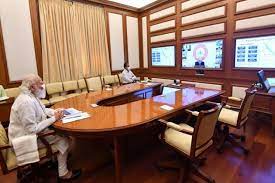
The Prime Minister (PM) chaired the 37th edition of Pro-Active Governance And Timely Implementation (PRAGATI) – the Information and Communication Technology (ICT) based multimodal platform, involving Central and State governments.
- The PM reviewed various projects worth Rs 1,26,000 crores along with the ‘One Nation – One Ration Card’ (ONORC) scheme’.
- The ONORC scheme aims at providing subsidised food grains to migrant workers and their family members at any fair price shop anywhere in the country under the National Food Security Act, 2013.
- Launched in 2015.
- It has been designed by the Prime Minister’s Office (PMO) team with the help of the National Informatics Center (NIC).
- It enables the PM to discuss the issues with the concerned central and state officials with full information and latest visuals of the ground-level situation.
- The PRAGATI platform uniquely bundles three latest technologies: Digital data management, video-conferencing and geo-spatial technology.
- It is a three-tier system (PMO, Union Government Secretaries, and Chief Secretaries of the States).
- Objective:
- Grievance Redressal.
- Programme Implementation.
- Project Monitoring.
- Significance:
- It promotes Cooperative Federalism as it brings together the Secretaries of Government of India and the Chief Secretaries of the States.
- It is a robust system for bringing e-transparency and e-accountability with real-time presence and exchange among the key stakeholders.
- It is an innovative project in e-Governance and Good Governance.
Pneumococcal Conjugate Vaccine (PCV) Immunisation Drive For Infants.:
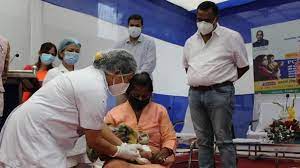
The Chief Minister of Andhra Pradesh has launched Pneumococcal Conjugate Vaccine (PCV) immunisation drive for infants.
- Earlier in December 2020, India’s first fully indigenously developed pneumococcal conjugate vaccine “Pneumosil” was launched.
- It prevents pneumococcal disease. It can protect both children and adults from pneumococcal disease.
- The vaccine is a mix of several bacteria of the pneumococci family, which are known to cause pneumonia—hence ‘conjugate’ is included in the name of the vaccine.
- Conjugate vaccines are made using a combination of two different components.
Pneumococcal disease:
- Pneumococcal disease is a name for any infection caused by bacteria called Streptococcus pneumoniae or pneumococcus.
- Most people carry pneumococcus in their nose and throat, where the bacteria do not cause any symptoms.
- However, sometimes the bacteria grow and spread to other parts of the body and that’s when people become sick.
- Effects: These bacteria can cause many types of illnesses, including pneumonia, which is an infection of the lungs. Pneumococcal bacteria are one of the most common causes of pneumonia.
Key Indicators For Asia And The Pacific 2021:
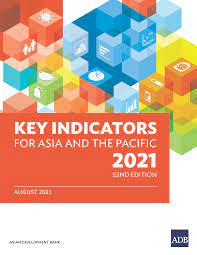
Asian Development Bank (ADB) released a report titled as the Key Indicators for Asia and the Pacific 2021.
- The report demonstrated that the region made substantial progress in the last two decades with respect to several development targets.
- It presents comprehensive economic, financial, social and environmental statistics for ADB’s 49 regional members.
Poverty:
- The pandemic pushed 75-80 million people in the developing Asia-Pacific into extreme poverty in 2020.
- About 203 million people — 5.2% of developing Asia’s population — lived in extreme poverty as of 2017.
- Without Covid-19, that number would have declined to an estimated 2.6% in 2020.
Contribution to Global GDP:
- Asia and the Pacific’s economy has grown at a robust pace in recent years and contributed as much as 35% to global Gross Domestic Product (GDP) in current US dollars in 2019.
- But Covid-19 took a toll just when weaker domestic investment and slowing global trade and economic activity started to challenge this momentum.
Household Income:
- A significant number of households engaged in business were severely affected by the pandemic.
- Among households engaged in agriculture or relying on wages and salary, more than half reported an increase in income, no change or a decrease of less than 26%.
Unemployment:
- As unemployment rates increased by at least 20% in 2020 due to the pandemic across the globe, the Asia-Pacific region lost an estimated 8% of working hours.
- As businesses were disrupted, many workers lost their jobs, leading to higher unemployment and underemployment rates.
Labour Force Participation: - From 2019 to 2020, labour force participation rates among women, on average, declined by 1.4%, while labour force participation rates among men declined by 0.8%.
- 71% of Asia-Pacific’s workforce is now in non-agricultural employment. From 2000-2019, the region’s non-agricultural employment rate grew to 71% from 52%, one of the fastest growth rates worldwide.
Sustainable Development:
- The pandemic is threatening Asia-Pacific’s progress toward critical targets under the United Nations-mandated Sustainable Development Goals (SDG).
Children Related Data:
- The prevalence of undernourishment decreased from more than 521 million people in 2001 to 316 million in 2019.
- Almost all learners in the region were affected by closure of schools during the Covid-19 pandemic.
- Despite efforts to continue school activities through remote learning, poorer students suffered greater disruption to their education during the pandemic.
KAZIND-21:

As part of military diplomacy and to strengthen the growing strategic relation with Kazakhstan, the 5th edition of Indo- Kazakhstan Joint Training Exercise, “KAZIND-21” will be conducted at Training Node, Aisha Bibi, Kazakhstan, from 30 August to 11 September 2021.
- The exercise is a joint training between both the Armies, which will boost the bilateral relations between India and Kazakhstan.
- The Indian Army contingent represented by a battalion of The Bihar Regiment consists of a total of 90 personnel led by a Contingent Commander. The Kazakhstan Army will be represented by a company group.
SAMRIDH Programme.:

Minister of Electronics and Information Technology (MeitY) launched Startup Accelerators of MeitY for pRoduct Innovation, Development and growth (SAMRIDH) programme.
- SAMRIDH will create a conducive platform for Indian software product startups to enhance their products and secure investments for scaling their business.
- The programme is being implemented by MeitY Start-up Hub (MSH).
- Government will support startups and entrepreneurs in the most challenging phase which is the initial risk phase, Vaishnaw had said earlier.
- The SAMRIDH programme will focus on accelerating 300 start-ups by providing customer connect, investor connect, and international expansion opportunities in the next three years.
- Also, an investment of up to Rs 40 lakh to startups, based on their current valuation and growth stage will be provided through selected accelerators.
- It will also facilitate equal matching investment by the accelerator or investor.
- The programme aims to further the Indian startup growth which has seen the emergence of 63 unicorns (Startups with over $1 billion valuation), making India the third largest unicorn hub globally with a total valuation of $168 billion.
World Water Week 2021:

World Water Week 2021 is being held entirely online, 23-27 August, with the theme Building Resilience Faster.
- World Water Week is the leading annual event on global water issues, organized by Stockholm International Water Institute since 1991.
- It is a week-long global water conference held each year in late August or early September.
- During the week, the Stockholm Water Prize, the Stockholm Junior Water Prize, and the Stockholm Industry Water Award are given out at their respective award ceremonies.
- The Week attracts participants from more than 130 countries and consists of a broad array of parallel activities convened by leading international organizations on a broad array of water-related topics, ranging from food security and health to agriculture, technology, biodiversity, and the climate crisis.
- Stockholm International Water Institute (SIWI) is a Stockholm-based policy institute that generates knowledge and guides decision-making towards water wise decisions. it was founded in 1991.
EASE 4.0:
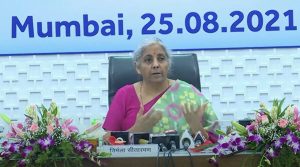
Union Minister of Finance and Corporate Affairs Smt. Nirmala Sitharaman today unveiled the fourth edition of the Public Sector Bank (PSB) Reforms Agenda ‘EASE 4.0’ for 2021-22 – tech-enabled, simplified, and collaborative banking
- She also unveiled the annual report for the PSB Reforms Agenda EASE 3.0 for 2020-21.
- Public Sector Banks have reported healthy profits and have accelerated on technology-driven reforms. These banks have reported a profit of Rs. 31,817 crore in FY21 as compared to a loss of Rs. 26,016 crore in FY20. This is the first year when PSBs have reported profit after five years of losses.
- Total gross non-performing assets stood at Rs. 6.16 lakh crore as of March 2021 – a reduction of Rs. 62,000 crore from March 2020 levels.
- Credit@click was a flagship initiative under EASE 3.0. Nearly 4.4 lakh customers have been benefitted through such instantaneous and simplified credit access.
- Nearly 72% of financial transactions happening at PSBs is now happening through digital channels.
- The next edition of EASE reforms i.e. EASE 4.0 aims to further the agenda of customer-centric digital transformation and deeply embed digital and data into PSBs’ ways of working.
‘SUJALAM’, A ‘100 Days Campaign:

The Ministry of Jal Shakti began ‘SUJALAM’, a ‘100 days campaign’ to create more and more ODF Plus villages by undertaking waste water management at village level particularly through creation of 1 million Soak-pits and also other Grey water management activities.
The key activities that will be organised in the villages under this campaign include:
- Organizing Community consultations, Khuli Baithaks and Gram Sabha meetings to analyze the current situation
- Pass resolution to maintain ODF sustainability and achieve needed number of soak pits to manage the grey water
- Develop a 100 days’ plan to undertake sustainability and soak pit construction related activities
- Construct requisite number of soak pits
- Retrofit toilets where needed through IEC and community mobilization and
- Ensure all newly emerging Households in the village have access to toilets.
Samarth Scheme:

In order to meet the skill gap in the industry, Ministry of Textiles is implementing Samarth Scheme for Capacity Building in Textile Sector.
- First batch in each 63 training centers have been completed successfully benefitting 1,565 artisans. The second batch will also complete during the month of August 2021 benefiting 1,421 artisans.
- Additionally, 65 new handicrafts training centers are being established to scale up the training program so that the maximum number of artisans can be benefitted.
- The salient features of the scheme are:
- Samarth Scheme is being implemented in association with State Government agencies, sectoral organisations of Ministry of Textiles, Manufacturing Industry, Industry Associations and MSME Associations.
- Formulated as per broad skilling framework adopted by Ministry of Skill Development & Entrepreneurship (MSDE).
- Comprise entry level skilling (Fresh workers) and Upskilling (existing worker).
- Mandatory placement of trainees- 70% for entry level & 90% for upskilling under organized sector.
- Aadhaar Enabled Biometric Attendance System (AEBAS) and Web based centralized Management Information System (MIS) for monitoring.
Missile Silo Fields:

Satellite images have revealed that China is building at least three missile silo fields in Yumen in Gansu province, near Hami in Xinjiang province, and at Hanggin Banner, Ordos City, in Inner Mongolia.
- It appears that China is constructing around 120 missile silos at Yumen, around 110 silos in Hami, and 29 in the Hanggin Banner field. Earlier this year, 16 missile silos were detected in the People’s Liberation Army Rocket Force’s (PLARF) Jilantai training area, also in Inner Mongolia.
- For several decades before these discoveries in 2021, China operated only 20 missile silos for its DF-5 liquid-fuel intercontinental ballistic missile (ICBM).
- On completion of the ongoing work, China could have 250-270 new missile silos, more than 10 times the number it had maintained for several decades.
- Some Chinese political scientists believe this could be China’s attempt to move towards a launch-on-warning (LOW) nuclear posture. LOW refers to a launch at an adversary on detection of an incoming missile before the adversary’s missile hits its target.
- It enables China to achieve its goal of increasing its nuclear warhead stockpile.
- The guess is that China could use these silos as decoys.
Fair And Remunerative Price:

The Cabinet Committee on Economic Affairs has approved Fair and Remunerative Price (FRP) of sugarcane for sugar season 2021-22 (October – September) at Rs. 290/- per quintal for a basic recovery rate of 10%.
- The cost of production of sugarcane for the sugar season 2021-22 is Rs. 155 per quintal.
- This FRP of Rs. 290 per quintal at a recovery rate of 10% is higher by 87.1% over production cost, thereby giving the farmers a return of much more than 50% over their cost.
- The FRP approved shall be applicable for purchase of sugarcane from the farmers in the sugar season 2021-22 (starting w.e.f. 1st October, 2021) by sugar mills.
- The FRP has been determined on the basis of recommendations of Commission for Agricultural Costs and Prices (CACP) and after consultation with State Governments and other stake-holders.




